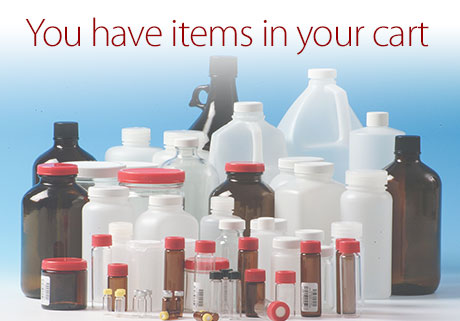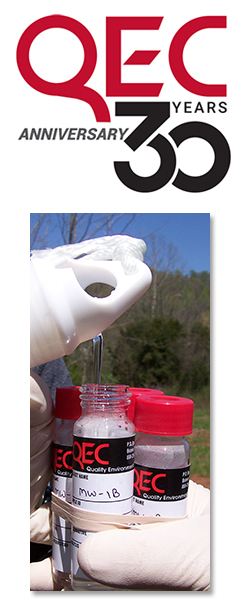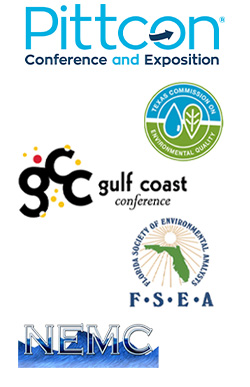 Winter • 2024 Winter • 2024 |
In this Issue: |
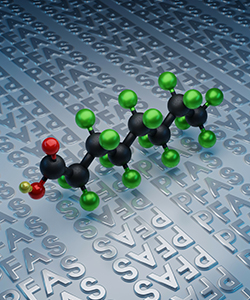 |
EPA moves to clarify PFAS status under RCRA EPA is proposing two rules that would modify the definition of hazardous waste as it applies to cleanups at permitted hazardous waste facilities. The purpose is to assure that regulatory authority for cleanup under the Resource Conservation and Recovery Act (RCRA) includes emerging chemicals of concern, such as PFAS, that may present substantial hazards, at permitted facilities. Current regulations do not clearly and accurately reflect the full authorities granted to EPA by Congress. EPA is also proposing to amend its RCRA regulations to add multiple PFAS compounds as hazardous constituents. These PFAS would be added to the list of substances identified for consideration in facility assessments and, where necessary, further investigation and cleanup through the corrective action process at hazardous waste treatment, storage, and disposal facilities. According to an EPA news release, the proposed rules would strengthen protections for communities and drinking water supplies located near the 1,740 permitted hazardous waste facilities across the nation. Corrective action under RCRA requires facilities that treat, store, or dispose of hazardous waste to protect health and the environment by investigating and cleaning up hazardous releases into soil, groundwater, surface water, and air. Hazardous waste cleanups are a crucial part of EPA’s focus on environmental justice and help to protect public health in part by addressing disparities in access to a clean and safe environment. EPA will publish these proposals in the Federal Register in the next few weeks. The “Definition of Hazardous Waste Applicable to Corrective Action from Solid Waste Management Units” proposed rule will be open for public comment for 30 days, whereas the “Listing of Specific PFAS as Hazardous Constituents” proposed rule will be open for public comment for 60 days. Source: United States Environmental Protection Agency |
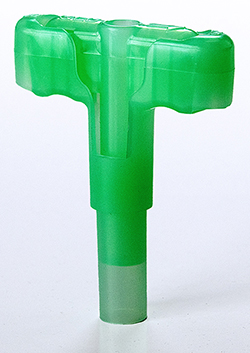 |
Product Spotlight: Combo Core™ New to the QEC catalog, the Combo Core™ sampler combines the capacities of 5 gram and 10 gram sampler sizes into a single tool. Combo Core™ comes ready to use with the plunger in the 5 gram position. Simply lift the plunger and rotate it 180 degrees to collect 10 gram samples from the same tool. The Combo Core™ sampler is the most convenient tool for collecting soil samples for field preservation. Molded from virgin-grade polypropylene and tested to be free of VOCs, SVOCs and PFAS, it’s suitable for collecting soil samples for any type of analysis. It’s molded with Bio-Tec’s EcoPure® additive (see article below) to reduce the environmental impact of plastic. Key Specifications
QEC still has 5g and 10g Terra Core® samplers in stock, but once inventory is exhausted, we will be using the Combo Core™ sampler exclusively. Method 5035 kits will continue to include the 5g Terra Core® sampler until supplies have been depleted. For custom-built 5035 kits, Combo Core™ may be substituted for the Terra Core® sampler at the customer's request. For questions and further information, please contact QEC's Customer Service Team. |
 |
Additive accelerates plastics degradation The EcoPure® additive is a proprietary blend of organic ingredients used to significantly increase the rate of plastic biodegradation in treated products Added to the plastic resin during the manufacturing process, it causes the plastic to degrade through a series of chemical and biological processes in the disposal environment. While plastics continue to fuel innovation in many fields, they are a major problem for waste disposal systems. Because they are made of carbon-based polymers, they do not biodegrade at the same rate as other organic materials. Adding EcoPure® to the manufacturing process creates a catalyst for biodegradation when the plastic product reaches the landfill. EcoPure® allows microbes to create a biofilm that coats the plastic. The microorganisms in the biofilm penetrate the plastic and expand the molecular structure to make room for microbes that send out chemical signals, a part of the quorum sensing process, that attract other microbes. Through this process, the microbes break down the chemical bonds of polymer chains at an accelerated rate. Engineered to work on many different types of plastics, including EVA, HDPE, LDPE, LLDPE, nylons, PET, PETG, polycarbonate and PP, additives are thoroughly tested using the ASTM D5511 method. The method measures the amount of methane and carbonaceous gases that are released by the microorganisms breaking down the plastic material. It demonstrates how quickly the treated plastic is broken down in relation to untreated plastic. |
|
|
QEC marks its 30th anniversary Thirty years ago (March 1994 to be exact) QEC shipped its first products to its customers. That this company has flourished through good times and challenging ones is a testament to our great products, our legendary customer service, and the excellent people who make both possible. QEC was founded in 1993 to fill a need for sampling containers designed and prepared specifically to meet the particular needs of the environmental laboratory industry; with a dedication to the most rigorous standards of product quality and responsive customer service. In the early going we served customers in a few states in the southeastern USA. Now QEC ships to all 50 states and more than two dozen countries on six continents, including a major distributor in South Korea. Today, we consider our roots in environmental science as a pedigree, not a boundary. QEC products are known to provide exceptional performance in any analytical laboratory application. We are proud to carry our highest standards and expectations into our fourth decade. Highlights of our first 30 years: 1994 Ship first QEC products to customers 1995 Develop proprietary process for reducing VOCs in HCl to levels suitable for sample preservation 1997 Establishment of QEC’s C-QEC certification program for Level 2 products 1998 Introduction of Custom-Preserved™ line of pre-preserved containers 1999 Addition of Method 5035 products to QEC’s product line 2000 Initial launch of qecusa.com web site. Major product catalog expansion 2002 QEC expands market coverage to all 50 states 2005 QEC ships its first products to international customers 2009 Introduction of Qromix™ chromatography vials, closures, septa 2010 Introduction of custom barcodes for Custom-Preserved™ containers 2011 Expansion of QEC’s line of headspace vials, closures, septa 2012 Major facility expansion to more than 52,000 sq. ft. for production, warehouse, offices 2013 Introduction of QEC’s UltraLab™ line of premium plasticware 2015 Expand Asian market through South Korean distributor 2016 Major expansion of lab facilities for preparing Custom-Preserved™ containers 2018 Introduction of Q-Seal™ precision-sealing HDPE Oblongs 2020 Major upgrade of website to full e-commerce capabilities 2021 Building & land acquisition for expansion of sales offices & conference facilities 2022 QEC opens Alaska sales office to serve Far West states and territories |
|
|
QEC trade show schedule for 2024 QEC will be exhibiting at these conferences and expos in 2024. If you're attending any of these events, please stop by for a visit. We would love to see you.
For more information or to schedule a specific time for a visit, please contact our Customer Service Team. |
| E | © 2024 | Quality Environmental Containers, Inc. |
